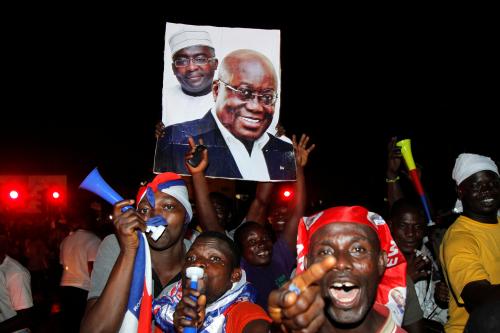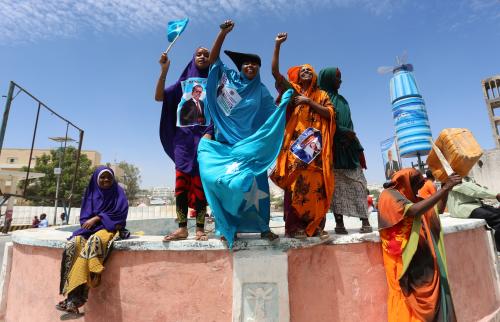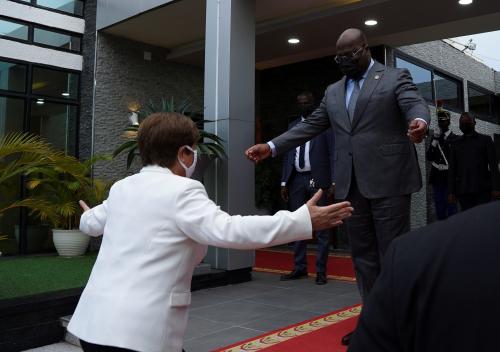In the 2016 edition of Foresight Africa, we published an infographic highlighting the list of presidential and legislative elections set to take place in 2016. As the year comes to an end, this week, we revisit the figure and examine the biggest electoral stories of 2016, from the Democratic Republic of the Congo’s President Joseph Kabila’s refusal to hold elections in November this year, to Gambian opposition leader Adama Barrow’s shock defeat of President Yahya Jammeh, to the upcoming Ghanaian presidential elections taking place this week.
Figure 1: Presidential and legislative elections in Africa in 2016
Source: NDI Global Elections Calendar as of December 11, 2015.
Elections to determine the successor to Joseph Kabila were meant to be held on November 27, 2016. However, the country’s electoral authority announced a delay until April 2018. According to critics of the government, this deal effectively extends President Kabila’s 15-year reign for another 15 months, giving him the time to change the constitution and allowing him to remain in power indefinitely. Moreover, there are fears that the country could be plunged into the same sectarian violence that followed Pierre Nkurunzia’s constitutional amendment in Burundi. When the National Electoral Independent Commission petitioned the nation’s highest court for a postponement, the news was met with protests from the opposition. The violence that followed claimed the lives of scores of people. An agreement produced by the African Union-supported national dialogue has brought a minor opposition leader, Samy Badibanga, to the post of prime minister in a power-sharing government. However, the main opposition party, Rassemblement, boycotted the dialogue, stating that the “summit was a syndicate of dictators who feel a need to stick together.” While the election has already been postponed, there remains uncertainty as observers wonder: What exactly will happen come midnight, December 19, 2016, the day President Kabila’s term officially expires?
In stark contrast to Joseph Kabila, outgoing Gambian President Yahya Jammeh—who lead the West African nation for 22 years—shocked critics by conceding defeat in the December 2 elections. He was beaten by opposition candidate Adama Barrow. Observers are especially shocked by the concession because Jammeh shut down the internet on the eve of elections, deployed security forces around the country, and boasted that “[t]his will the biggest landslide in the history of the country.” After taking power in a 1994 coup, Jammeh grew to be one of Africa’s most eccentric and ruthless leaders. Some attribute his shock concession to dissatisfaction over Gambia’s growing isolationism. After his last victory in 2011, the Economic Community of West African States (ECOWAS) refused to endorse his victory, saying voters and the opposition had been “cowed by repression and intimidation.” In an infamous 2011 BBC interview, Jammeh claimed he would “rule this country for one billion years” if necessary. However, in his concession remarks, he seemed to accept that the people “have decided that I should take the back seat.” Speaking to the public on Gambian television on December 2, Jammeh congratulated Barrow on a “clear victory” wishing “him […] [and] all Gambians the best.”
Finally, we turn to the Ghanaian presidential elections. In a replay of the 2012 elections, President John Dramani Mahama will once again face off against Nana Akufo-Addo, who will be making his third bid for the top job, in hopes that his third time running will be the charm. The economy has emerged as the largest issue this election. Ghana has been plagued with sluggish growth, high inflation, and rising unemployment. On one hand, Nana Akufo-Addo, the former lawyer, attorney general, and foreign minister, has made his one-district, one-factory policy the centerpiece of his campaign. He has promised to establish a factory in each of Ghana’s 216 districts, in an effort to spur industrialization in the agriculture-dependent West African state. On the other hand, Mahama has campaigned on the basis of “Putting People First,” emphasizing achievements in health care, education, and social protection. The 2016 election will likely be as tight at the 2012 election. This raises the possibility of a second round run-off vote between the top two candidates.
Figure 2: 2016 Election Map

Source: NDI Global Elections Calendar as of December 11, 2015.
Other presidential elections on the continent unfolded as follow. Benin, São Tomé and Príncipe and the Central African Republic elected new presidents, while Zambia, Cabo Verde, Gabon, and Niger granted their incumbent presidents a second term: Ali Bongo won a highly contested election by a margin below 2 percent and Niger’s President Mahamadou Issoufou was re-elected as the opposition boycotted the runoff elections. In other African countries, however, certain leaders extended their lengthy presidential rule. Idriss Deby of Chad and Yoweri Museveni of Uganda respectively won their fifth presidential terms. Congo’s President Denis Sassou-Nguesso sought and won a third consecutive presidential term, after a 2015 constitutional change allowing him to run for a third time. Equatorial Guinea’s president Teodoro Obiang extended his 37-year presidential rule as he received 93.7 percent of votes. Djibouti’s president Ismaïl Omar Guelleh was re-elected for a fourth term. Somalia’s elections were scheduled for November 30, they have now been postponed.
Junaid Belo-Osagie contributed to this post.








Commentary
Figures of the week: Presidential elections in Africa in 2016
December 7, 2016